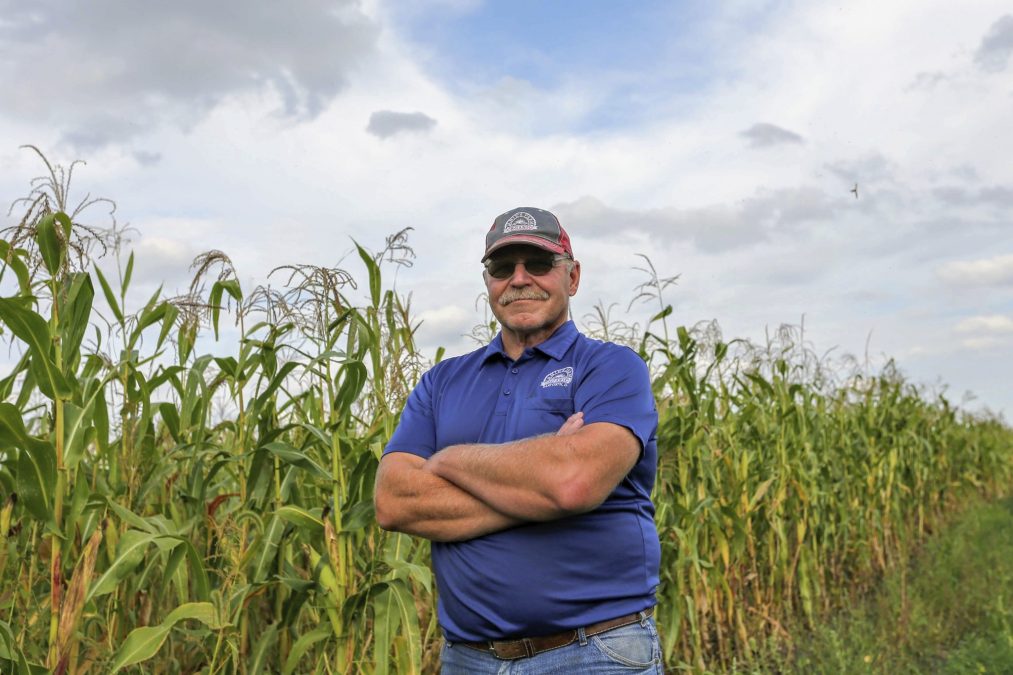The Future of Farming and the Power of Soil: A Conversation with Shumei Natural Agriculture Farmer, Harold Wilken

Shumei sat down for a discussion with one of its Natural Agriculture farmers, Harold Wilken. For over thirty years, Harold has stewarded Janie’s Farm, located in rural Illinois, outside of the greater Chicago Metro area. We spoke about his journey from working as a conventional farmer to becoming a Natural Agriculture farmer. He also shared his thoughts on the future of farming in America and the growing interest in organic food during the coronavirus pandemic.
Janie’s Farm is a 200-acre USDA Certified Organic farm where different varieties of corn, wheat and soybeans are grown using the Natural Agriculture approach to farming wherever possible. Harold started his career as a conventional farmer, but began to experiment with organic farming in the 1990s when he wasn’t seeing positive results in the quality of his crops. However, he didn’t have the opportunity to begin farming organically until the early 2000s, as the landowners were not yet familiar with the benefits of organic farming.
When Harold transitioned to organic farming, he noticed how the soil became significantly healthier. He said “the soil looked like chocolate cake with worms, and residue breaking down, indicating soil health.” Harold had not seen this level of soil health in his many years of using conventional methods. Witnessing this improvement in the soil convinced him of the power of chemical-free farming.
Harold’s journey did not stop with organic farming. In 2015, he was introduced to Natural Agriculture by a Shumei member in the USA. The Shumei farmer asked Harold if he would be open to trying the Natural Agriculture approach, which would involve zero inputs in the growing process. This would be different from what he was doing with organic, which still allowed him to use organic fertilizers, pesticides, manure and composts. Natural Agriculture also emphasizes planting and saving indigenous seeds and growing crops that the land wants to grow. Harold saw a need in the market for more heirloom grains, and decided to explore it further.
Once again, Harold saw the difference in the soil and that it was possible for pure soil to grow healthy crops without any additives. Natural Agriculture also taught him the symbiotic relationship of the seed and soil, and how they adapt to each other over time. Harold now saves approximately eighty percent of their seeds on Janie’s Farm, and, his land has become healthier and more resilient, producing a wide range of Natural Agriculture gains.
In addition to changing how he farms, Natural Agriculture has shifted his views on life in general. When Harold met Shumei Natural Agriculture farmers and they spoke about listening to nature and the sacred connection between farmers and the land, he realized it aligned with what he had always deeply felt. After his daughter, Janie, passed in 2001, he sensed that her spirit was guiding him and his wife to find peace through farming, and specifically through Natural Agriculture.
Harold and his wife have gradually transitioned to using as many Natural Agriculture practices as possible stressing the importance of respecting nature and listening to the soil and allowing it to regenerate itself. It has also enabled him to understand his farm on a much deeper level.
Through his own journey, Harold has become a local leader in sustainable agriculture in the Midwest, paving the way for other farmers and landowners in the area to transition from conventional to organic farming practices. “It is often the landowners who are pushing farmers to transition to organic,” he said, which is a departure from his earlier days. Now Harold teaches and mentors other farmers in his area on how to transition their farms to organic agriculture and how to let nature be at the center of their farming.
Overtime Harold has observed an increased demand for natural, chemical-free, organic produce in America. People who live in areas where healthier food is available are eating better than their relatives, because they are able to feel and see the physical and mental benefits of consuming healthy food. He noted the importance of access and also how younger generations are more interested in farm-to-table produce, and are more conscious of where their food is coming from and how it is grown.
“Many need that personal connection with their farmer”, he said. “And they are more mindful, grow their own vegetables, and make smoothies for their kids instead of giving them packaged products. The next generation is more conscious than the Baby Boomer Generation,” he added.
During the pandemic, Janie’s Mill sales increased significantly. Many people in his community wanted to start cooking and baking again – often for mental wellness and to feel a sense of connection to their food. Quite a few of his customers launched their own bakeries and started businesses out of their homes after losing their jobs. Harold hopes the future of farming continues to follow this trend of consuming more locally-grown produce, getting to know one’s farmer, and enjoying slower, farm-to-table meals.
We asked Harold if he would ever go back to growing and eating conventional produce and he said that he is officially a Natural Agriculture “convert” and will never look back.

